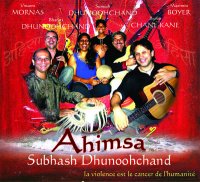AHIMSA IN YOGA, MUSIC AND SPIRITUALITY

> Presentacion para la reunion de lanzamiento del proyecto <
> Free Streaming, Music Downloads, etc… <
> Tabla classique à La Réunion <
Ahimsa (Sanskrit: Devanagari; अहिंसा; IAST ahiṃsÄ�, PÄ�li: avihiṃsÄ�) is a term meaning to do no harm (literally: the avoidance of violence – himsa). It is an important tenet of the religions that originated in ancient India (Hinduism, Buddhism and especially Jainism).
Ahimsa is a rule of conduct that bars the killing or injuring of living beings. It is closely connected with the notion that all kinds of violence entail negative karmic consequences. The extent to which the principle of non-violence can or should be applied to different life forms is controversial between various authorities, movements and currents within the three religions and has been a matter of debate for thousands of years. Though the origins of the concept of ahinsa are unknown, the earliest references to ahinsa are found in the texts of historical Vedic religion, dated to 8th century BCE. Here, ahinsa initially relates to „non-injury“ without a moral connotation, but later to non-violence to animals and then, to all beings. Though meat-eating and slaughter of animals are criticized by some Hindu texts, other texts present counter-arguments in support of ritual sacrifice. In the 19th and 20th centuries, prominent figures of Indian spirituality such as Swami Vivekananda, Ramana Maharishi, Swami Sivananda and A. C. Bhaktivedanta Swami Prabhupada emphasized the importance of ahinsa. Mahatma Gandhi applied ahinsa to politics, by his non-violent satyagrahas. Read More: > HERE <
One of French’s most innovative sound artists, Subhash Dhunoohchand’s consistently challenging albums and live performances have been central to the continued rise of Indian-influenced fusion music. A pivotal figure in Reunion Island, France he has pursued his own audio explorations with his new project TABLATRONIC.
Here, the dates of our next concerts in Reunion Island:
- 7 Avril 2010, Le Mag TéléRéunion, AHIMSA et YATRA
- 9 Avril 2010, salle guy alphonsine YATRA musique live et danse indienne (kathak, bharatanatyam, odissie)
- 10 Avril 2010, Show Case Hyper U Bel Air St Louis, 15H à 18H, Tablatronic et Ahimsa
- 14 Avril 2010, probablement dans l’Est…
- 16 Avril 2010, probablement dans le Sud…
- 17 Avril 2010, probablement dans le Nord-Est…
- Keep in Touch !
Born in Mauritius of Indian parents he is the 4th generation in the island call the paradise of the Indian Ocean. Subhash Dhunoohchand was inspired by his father, late Balram Dhunoohchand to learn the precision beats of the tabla, which he began playing when he was 17. Later he went to India for further classical training as a student of Pandit Sudhir Kumar Saxena. He ha s been working with such diverse musicians as Pt Hariprasad Chaurasia, Pt Budhaditya Mukherjee, Rupak Kulkarni, Rakesh Chaurasia, Sazed Ul Alam, Trilok Gurtu and many well known jazz musicians like Ola Melander, Anatholi Bulkin, Xavier Rudd and Lars Gullikson.
Subhash Dhunoohchand is the disciple of Pt S.K. Saxena and has played with great musician like, Pt .Chaurasia, Pt B. Mukherjee, Trilok Gurtu, Susheela Raman, Xavier Rudd etc….// Fusion of Indian, African & Reunion Music. La rencontre de la musique indienne, africaine & réunionnaise.
In the mid-90s Subhash founded Cosmic Sound, an indo jazz fusion music group. In 1993 he release his first CD, Raga Marwa of Indian Classical Music in Sweden with Sazed Ul Alam and at the same time performing with the jazz fusion music group. His groundbreaking debut release Obsession, was recorded in France, and featured contributions from Anupriya Deotale, late Soudama Jankee, Anatholi Bulkin, Celine Bonacina and Rupak Kulkarni. An astonishing marriage of traditional Indian sounds and jazz, it deservedly received strong reviews.
For this European tour Subhash is travelling with his son Sumesh on tabla, Bharati on vocal, Bruno Chane Kane on electric guitar from France and Nandkumar on bass tabla. We are also performing with some indian music musicians from London. A dedicated fusionist with both an uncanny ear for melody and an innate talent for complex rhythms, Subhash Dhunoohchand always seems to be one step ahead of his electronic.
Yama, niyama, asana, pranayama, pratyahra, dharana, dhyana and samadhi are the eight limbs of yoga . Ahimsa, satya, asteya, bramacharya and aparigraha are the five yamas – The yoga sutras of Patanjali, 2.30-31
In the classical yoga system described by Patanjali more than two thousand years ago, the first stage (or limb, as they are generally called) of yoga is Yama (ethical disciplines) and of these, Ahimsa is the first.
In short, according to Patanjali, ahimasa, non-violence or, as Desikashar defines it, „Consideration for all living creatures, especially those who are innocent, in difficulty or worse off than we are“ should be the very beginning of any yoga practice.
- www.gandhiinstitute.org
- www.bansuriflute.com
- VEDIC BOOKS: THE ART OF TABLA RYTHM <
- TRADITIONAL MUSIC INSTRUMENTS, Sound & Yoga <
- YAMA AND NIYAMA <
- Meet Hariprasad Chaurasia, studies, friends, fans at fb <
- Meet Prasad Bhandarkar´s, studies, friends, fans at fb <
- Meet Sheela Bringi, studies, friends, fans at fb <
- Meet Subhash fans club at facebook <
- Meet AHIMSA Nonviolence , friends , fans at fb <
- Meet Ghandi Institute of Nonviolence, friends, fans at fb <
Comments are closed.